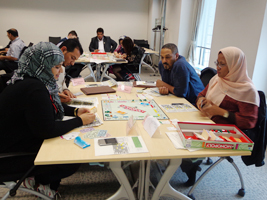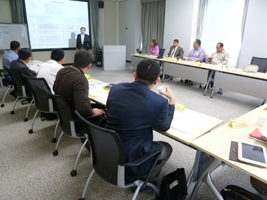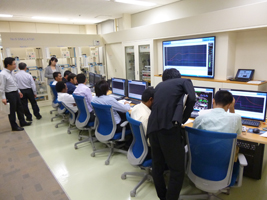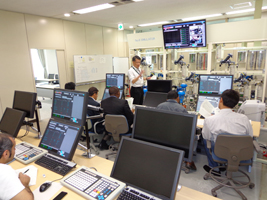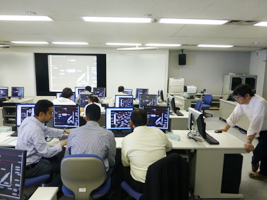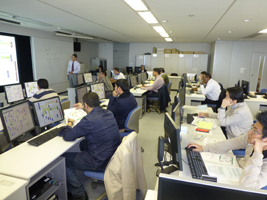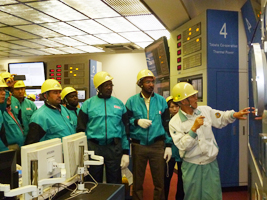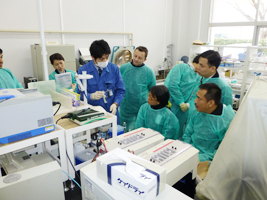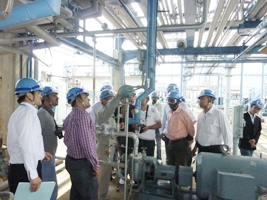Outline of HRD Programs in Japan
HRD programs in Japan consist of classroom lectures given by specialists at JCCP Headquarters, hands-on training using simulators, and visits to oil companies, engineering companies, the offices of equipment manufacturers, plants, and refineries. The visits provide practical training through observation of various processes and discussions with experts.
Lectures and Workshops by Experts
In addition to lectures by experts in fields related to the oil industry, experts in their relevant fields in Japanese companies and research institutions are invited to give theoretical and practical lectures. Workshops are also held in line with the theme of each course, to provide interactive training through group discussions and presentations.
Simulators
JCCP has simulators that run two types of DCS (distributed control systems). Each DCS is connected to a miniature plant to provide training in basic and applied process control and safety devices under a training environment that simulates an actual plant.
CAI:Computer Assisted Instruction
CAI(Computer Assisted Instruction) facility of process models of dynamic simulations enables participants to engage in simulated operations of representative refining process units, such as the CDU (crude oil distillation unit), FCC (fluid catalytic cracking unit), and R-FCC (residue oil fluid catalytic cracking unit).
The facility is also equipped with a refinery LP model for training in optimal production planning and case studies of the engineering economics of various processes.
Lectures using CAI allow each participant to study at a pace that suits his or her own ability (professional capacity, experience, etc.), and help facilitate their understanding of the relevant subject.
Onsite Programs at Various Companies; Plants, Refineries, and Research Institutions in Japan
Participants of HRD programs in Japan have opportunities to visit manufacturing companies, plants and research institutions in Japan to receive lectures from experts, inspect actual machines on site, and in some cases gain hands-on experience on a trial basis. Through questions and answers and exchanges of views with working experts, they gain a deeper understanding of technologies and management systems. Visits are made to a wide range of companies and facilities, including oil companies, engineering companies, plant instrument manufacturers and national research institutions, in line with the theme of each course.
Voice of Participants
- My sentiments and views of "Management and Leadership for Women in Petroleum Industry" (November 2020) [19/11/2020]
- My sentiments and views of " Capability Development for Women's Empowerment in Petroleum Industry" (November 2018) [21/11/2018]
- My sentiments and views of " Refinery and Technology Management -for next Technology Executive-" (February 2018) [9/2/2018]
- My sentiments and views of " Capability Development for Women's Empowerment in Petroleum Industry" (September 2017) [22/9/2017]
- My sentiments and views of "Management and Leadership for Women in Petroleum Industry" (November 2016) [25/11/2016]
- My sentiments and views on "Strategic Management for Petroleum Industry -for Next Leaders- " (October 2016) [11/10/2016]
- My sentiments and views of Human Resource Management (May 2013) [01/09/2013]
- My sentiments and views of Maintenance Management (January 2001) [01/09/2013]
- My sentiments and views of Human Resource Development (October 2004) [01/05/2013]
- My sentiments and views of Human Resource Development (October 2006) [01/05/2013]
- My sentiments and views of Human Resource Management (May 2010) and Training Management (October 2004)[01/01/2013]
- My sentiments and views of Advanced Field Devices & Control (October 2009)[01/01/2013]
- My sentiments and views of the TR-7-10 Refinery Management course [01/10/2010]
- Mother-Daugther Participation in JCCP Courses(Kazakhstan) [10/07/2009]

